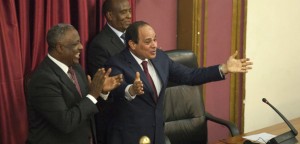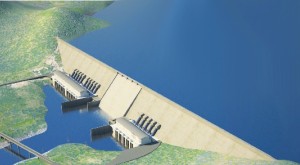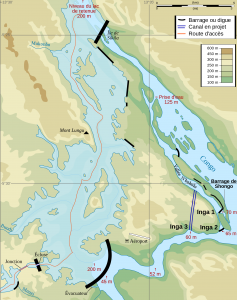Everything is connected.

An article in Foreign Policy remarks on Egypt’s President Abdel Fattah el-Sisi’s sudden support for the grand Renaissance Dam project in Ethiopia. The basic idea of the article is that el-Sisi is looking for stability with Egypt’s neighbors to the North while becoming increasingly involved in the evolving geopolitical situation in the Middle East. He has pledged Egyptian ground forces to help Saudi Arabia in defeating the Houthi rebels in Yemen and has convinced the Arab league to establish a permanent military force for crisis response in the region.
Dam the Nile
There has been tension between Egypt, Sudan, Ethiopia and the other eight countries along the the Nile, the world’s longest river, for years and the rhetoric has been getting intense of late.

The issue has to do with Ethiopia’s construction of the Renaissance Dam and Egypt’s concerns, up to now, that the project will interrupt the flow of the river on which it and Sudan depend. The dam will have a capacity of 5,250 MW and is is expected to produce over 15,000 GWH/year or three times the country’s current power consumption. More information is available from Ethiopia here.
The Renaissance Dam is more than twice the size of the Aswan High Dam further downstream on the Nile, which has a capacity of 2,100 MW and is credited with supplying half of Egypt’s electricity needs when it began operation in 1967.
The question of how to manage water rights between those who are further upstream and those downstream is complex and the agreement reached between Ethiopia, Egypt and Sudan spells out 10 principles which will all require further negotiation, including principles of:
- cooperation
- development, regional integration and sustainability
- not causing significant damage
- fair and appropriate use
- the dam’s storage reservoir first filling, and dam operation
- building trust
- exchange of information and data
- dam security
- sovereignty, unity and territorial integrity of the State
- peaceful settlement of disputes
Principal number 5 will be difficult as it will require approximately one entire year of the Nile’s flow for the reservoir’s first filling, so Egypt will insist that it be done over a long time or only in such a away as not to affect Aswan and the rest of Egypt’s economy which depends in the river.
Dam the Congo
Water and energy also come together in an even more ambitious and controversial project to dam the Congo river in the DRC. The World Bank is a major supporter of the project called the Grand Inga Dam which when fully developed could provide an incredible 40,000 MW or almost twice that of the Three Gorges Dam in China. A complete write-up of the project by the bank can be found here.

The project would add one third to the total generation capacity of the continent and provide electricity all the way to South Africa. The controversy stems from the fact that only 6 per cent of the DRC currently has access to electricity and most suffer constant interruptions in service.
Critics such as the group International Rivers, which is generally opposed to dams, are concerned that the power produced will not be used to provide electricity to the people of the DRC, as happened with Aswan in Egypt, but to make money for the ruling elite.
There are currently two dams on the Congo in the area and the next phase of the project is called Inga 3 and would have 4,800 MW of capacity of which 1,000 are reserved for the DRC’s power company and 2,500 for South Africa’s Eskom according to The Guardian.
Tough Choices
If one accepts the premise that people need energy to improve their quality of life and also that we must limit increasing the quantity of CO2 we put into the atmosphere, then it stands to reason that the world’s large hydroelectric resources ought to be developed.
The issue is that such projects also cause tremendous ecological and social impact and the difficult thing is that Africa does need the power. What is also concerning is the nature of some of the governments involved and in fact the World Bank has “ring fenced” Inga 3 to try and keep corruption and waste to a minimum in the project.


if african solves its power shortages it will unlock a critical enabler for economic progress especially as the world economies become more knowledge intensive